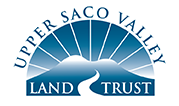
Our History
The idea for the formation of the Mount Washington Valley Land Trust, now known as the Upper Saco Valley Land Trust, initially began as a collaborative effort between Tin Mountain Conservation Center and Mount Washington Valley Community Supported Agriculture. These organizations wanted to promote conservation and sustainable community growth through environmental education, community farming and land protection. Although there were 40 local and regional land trusts in New Hampshire, none were active in the Mount Washington Valley, the second fastest growing region in the state.
The Mount Washington Valley Land Trust was founded in September of 2000 as a grassroots initiative to preserve land for community benefit in the watershed of the upper Saco River in New Hampshire and Maine. From the beginning, we planned to involve the community in the organization’s development. We held our first public information session in October 2000, out of which was formed a Steering Committee to guide the organization’s development.
After receiving our 501(c)(3) nonprofit status from the IRS in May 2001, we elected a 15 member Board of Directors, changed our name to the Upper Saco Valley Land Trust (USVLT) to better reflect the area we served, and began soliciting membership contributions. We completed our first land conservation project, a conservation easement, in December of 2001.
In the following decade, we completed 38 land projects, and by the beginning of 2019 had doubled that number, helping to conserve over 12,000 acres in our 11 town service area.
We adopted the Land Trust Alliance’s standards and practices in June 2005, and received accreditation from the Land Trust Alliance in April 2015.
Significant milestone projects for USVLT include the purchase of land adjacent to Foss Mountain in Eaton in 2011, helping with the creation of the Albany Town Forest in 2012, conservation of Weston’s Farm in 2012, and the creation of the Pine Hill Community Forest in 2018. In addition to our core work of land conservation, the Land Trust also has active programming to advocate for local agriculture and water quality issues.
